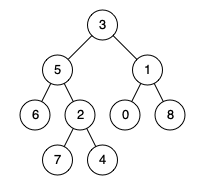LeetCode –236(二叉树的最近公共祖先)
给定一个二叉树, 找到该树中两个指定节点的最近公共祖先。
百度百科中最近公共祖先的定义为:“对于有根树 T 的两个节点 p、q,最近公共祖先表示为一个节点 x,满足 x 是 p、q 的祖先且 x 的深度尽可能大(一个节点也可以是它自己的祖先)。”
示例 1:

1
2
3
| 输入:root = [3,5,1,6,2,0,8,null,null,7,4], p = 5, q = 1
输出:3
解释:节点 5 和节点 1 的最近公共祖先是节点 3 。
|
示例 2:

1
2
3
| 输入:root = [3,5,1,6,2,0,8,null,null,7,4], p = 5, q = 4
输出:5
解释:节点 5 和节点 4 的最近公共祖先是节点 5 。因为根据定义最近公共祖先节点可以为节点本身。
|
示例 3:
1
2
| 输入:root = [1,2], p = 1, q = 2
输出:1
|
解法一
通过存储每个节点对应的父节点,来寻找最近公共祖先
- 首先通过map存储节点对应的父节点
- 寻找其中一个节点p的所有的父节点,存储在list中
- 遍历q节点的父节点是否在list中,如果在list中表示找到,直接返回。否则没找到返回null。
代码为:
1
2
3
4
5
6
7
8
9
10
11
12
13
14
15
16
17
18
19
20
21
22
23
24
25
26
27
28
29
30
31
32
33
34
35
36
|
class Solution {
HashMap<TreeNode,TreeNode> map = new HashMap<>();
List<TreeNode> list = new ArrayList<>();
public TreeNode lowestCommonAncestor(TreeNode root, TreeNode p, TreeNode q) {
ceature(root);
while (p!=null){
list.add(p);
p = map.get(p);
}
while (q!=null){
if (list.contains(q)) return q;
q = map.get(q);
}
return null;
}
public void ceature(TreeNode root){
if (root.left!=null){
map.put(root.left,root);
ceature(root.left);
}
if (root.right!=null){
map.put(root.right,root);
ceature(root.right);
}
}
}
|
解法二
递归,分别判断p和q节点是否在根节点的两侧还是左侧还是右侧。
- 在左侧查找节点p和节点q,判断是否存在。
- 如果都存在左侧或右侧,则在左侧或右侧查找
- 否则直接返回根节点
代码为:
1
2
3
4
5
6
7
8
9
10
11
12
13
14
15
16
17
18
19
20
21
22
23
24
25
26
27
|
class Solution {
public TreeNode lowestCommonAncestor(TreeNode root, TreeNode p, TreeNode q) {
if (root==null) return null;
if (p.val==root.val || q.val==root.val) return root;
if (find(root.left,p) && find(root.left,q)) return lowestCommonAncestor(root.left,p,q);
if (find(root.right,p) && find(root.right,q)) return lowestCommonAncestor(root.right,p,q);
return root;
}
public boolean find(TreeNode root,TreeNode node){
if (root==null) return false;
if (root.val==node.val) return true;
return find(root.left,node) || find(root.right,node);
}
}
|

